- Home
- Salman Rushdie
Midnight's Children Page 25
Midnight's Children Read online
Page 25
To end this account of the early days of my transformed life, I must add one painful confession: it occurred to me that I could improve my parents’ opinion of me by using my new faculty to help out with my schoolwork—in short, I began to cheat in class. That is to say, I tuned in to the inner voices of my schoolteachers and also of my cleverer classmates, and picked information out of their minds. I found that very few of my masters could set a test without rehearsing the ideal answers in their minds—and I knew, too, that on those rare occasions when the teacher was preoccupied by other things, his private love-life or financial difficulties, the solutions could always be found in the precocious, prodigious mind of our class genius, Cyrus-the-great. My marks began to improve dramatically—but not overly so, because I took care to make my versions different from their stolen originals; even when I telepathically cribbed an entire English essay from Cyrus, I added a number of mediocre touches of my own. My purpose was to avoid suspicion; I did not, but I escaped discovery. Under Emil Zagallo’s furious, interrogating eyes I remained innocently seraphic; beneath the bemused, head-shaking perplexity of Mr. Tandon the English master I worked my treachery in silence—knowing that they would not believe the truth even if, by chance or folly, I spilled the beans.
Let me sum up: at a crucial point in the history of our child-nation, at a time when Five Year Plans were being drawn up and elections were approaching and language marchers were fighting over Bombay, a nine-year-old boy named Saleem Sinai acquired a miraculous gift. Despite the many vital uses to which his abilities could have been put by his impoverished, underdeveloped country, he chose to conceal his talents, frittering them away on inconsequential voyeurism and petty cheating. This behavior—not, I confess, the behavior of a hero—was the direct result of a confusion in his mind, which invariably muddled up morality—the desire to do what is right—and popularity—the rather more dubious desire to do what is approved of. Fearing parental ostracism, he suppressed the news of his transformation; seeking parental congratulations, he abused his talents at school. This flaw in his character can partially be excused on the grounds of his tender years; but only partially. Confused thinking was to bedevil much of his career.
I can be quite tough in my self-judgments when I choose.
What stood on the flat roof of the Breach Candy Kindergarten—a roof, you will recall, which could be reached from the garden of Buckingham Villa, simply by climbing over a boundary wall? What, no longer capable of performing the function for which it was designed, watched over us that year when even the winter forgot to cool down—what observed Sonny Ibrahim, Eyeslice, Hairoil, and myself, as we played kabaddi, and French cricket, and seven-tiles, with the occasional participation of Cyrus-the-great and of other, visiting friends: Fat Perce Fishwala and Glandy Keith Colaco? What was present on the frequent occasions when Toxy Catrack’s nurse Bi-Appah yelled down from the top floor of Homi’s home: “Brats! Rackety good-for-nothings! Shut your noise!” … so that we all ran away, returning (when she vanished from our sight) to make mute faces at the window at which she’d stood? In short, what was it, tall and blue and flaking, which oversaw our lives, which seemed, for a while, to be marking time, waiting not only for the nearby time when we would put on long trousers, but also, perhaps, for the coming of Evie Burns? Perhaps you’d like clues: what had once hidden bombs? In what had Joseph D’Costa died of snake-bite? … When, after some months of inner torment, I at last sought refuge from grown-up voices, I found it in an old clocktower, which nobody bothered to lock; and here, in the solitude of rusting time, I paradoxically took my first tentative steps towards that involvement with mighty events and public lives from which I would never again be free … never, until the Widow …
Banned from washing-chests, I began, whenever possible, to creep unobserved into the tower of crippled hours. When the circus-ring was emptied by heat or chance or prying eyes; when Ahmed and Amina went off to the Willingdon Club for canasta evenings; when the Brass Monkey was away, hanging around her newly-acquired heroines, the Walsingham School for Girls’ swimming and diving team … that is to say, when circumstances permitted, I entered my secret hideout, stretched out on the straw mat I’d stolen from the servants’ quarters, closed my eyes, and let my newly-awakened inner ear (connected, like all ears, to my nose) rove freely around the city—and further, north and south, east and west—listening in to all manner of things. To escape the intolerable pressures of eavesdropping on people I knew, I practiced my art upon strangers. Thus my entry into the public affairs of India occurred for entirely ignoble reasons—upset by too much intimacy, I used the world outside our hillock for light relief.
The world as discovered from a broken-down clocktower: at first, I was no more than a tourist, a child peeping through the miraculous peepholes of a private “Dilli-dekho” machine. Dugdugee-drums rattled in my left (damaged) ear as I gained my first glimpse of the Taj Mahal through the eyes of a fat Englishwoman suffering from the tummy-runs; after which, to balance south against north, I hopped down to Madurai’s Meenakshi temple and nestled amongst the woolly, mystical perceptions of a chanting priest. I toured Connaught Place in New Delhi in the guise of an auto-rickshaw driver, complaining bitterly to my fares about the rising price of gasoline; in Calcutta I slept rough in a section of drainpipe. By now thoroughly bitten by the travel bug, I zipped down to Cape Comorin and became a fisher-woman whose sari was as tight as her morals were loose … standing on red sands washed by three seas, I flirted with Dravidian beachcombers in a language I couldn’t understand; then up into the Himalayas, into the neanderthal moss-covered hut of a Goojar tribal, beneath the glory of a completely circular rainbow and the tumbling moraine of the Kolahoi glacier. At the golden fortress of Jaisalmer I sampled the inner life of a woman making mirrorwork dresses and at Khajuraho I was an adolescent village boy, deeply embarrassed by the erotic, Tantric carvings on the Chandela temples standing in the fields, but unable to tear away my eyes … in the exotic simplicities of travel I was able to find a modicum of peace. But, in the end, tourism ceased to satisfy; curiosity began to niggle; “Let’s find out,” I told myself, “what really goes on around here.”
With the eclectic spirit of my nine years spurring me on, I leaped into the heads of film stars and cricketers—I learned the truth behind the Filmfare gossip about the dancer Vyjayantimala, and I was at the crease with Polly Umrigar at the Brabourne Stadium; I was Lata Mangeshkar the playback singer and Bubu the clown at the circus behind Civil Lines … and inevitably, through the random processes of my mind-hopping, I discovered politics.
At one time I was a landlord in Uttar Pradesh, my belly rolling over my pajama-cord as I ordered serfs to set my surplus grain on fire … at another moment I was starving to death in Orissa, where there was a food shortage as usual: I was two months old and my mother had run out of breast-milk. I occupied, briefly, the mind of a Congress Party worker, bribing a village schoolteacher to throw his weight behind the party of Gandhi and Nehru in the coming election campaign; also the thoughts of a Keralan peasant who had decided to vote Communist. My daring grew: one afternoon I deliberately invaded the head of our own State Chief Minister, which was how I discovered, over twenty years before it became a national joke, that Morarji Desai “took his own water” daily … I was inside him, tasting the warmth as he gurgled down a frothing glass of urine. And finally I hit my highest point: I became Jawaharlal Nehru, Prime Minister and author of framed letters: I sat with the great man amongst a bunch of gap-toothed, stragglebeard astrologers and adjusted the Five Year Plan to bring it into harmonic alignment with the music of the spheres … the high life is a heady thing. “Look at me!” I exulted silently. “I can go any place I want!” In that tower which had once been filled choc-a-block with the explosive devices of Joseph D’Costa’s hatred, this phrase (accompanied by appropriate ticktock sound effects) plopped fully-formed into my thoughts: “I am the bomb in Bombay … watch me explode!”
Because the feeling had come upon m
e that I was somehow creating a world; that the thoughts I jumped inside were mine, that the bodies I occupied acted at my command; that, as current affairs, arts, sports, the whole rich variety of a first-class radio station poured into me, I was somehow making them happen … which is to say, I had entered into the illusion of the artist, and thought of the multitudinous realities of the land as the raw unshaped material of my gift. “I can find out any damn thing!” I triumphed, “There isn’t a thing I cannot know!”
Today, with the hindsight of the lost, spent years, I can say that the spirit of self-aggrandizement which seized me then was a reflex, born of an instinct for self-preservation. If I had not believed myself in control of the flooding multitudes, their massed identities would have annihilated mine … but there in my clocktower, filled with the cockiness of my glee, I became Sin, the ancient moon-god (no, not Indian: I’ve imported him from Hadhramaut of old), capable of acting-at-a-distance and shifting the tides of the world.
But death, when it visited Methwold’s Estate, still managed to take me by surprise.
Even though the freezing of his assets had ended many years ago, the zone below Ahmed Sinai’s waist had remained as cold as ice. Ever since the day he had cried out, “The bastards are shoving my balls in an ice-bucket!”, and Amina had taken them in her hands to warm them so that her fingers got glued to them by the cold, his sex had lain dormant, a woolly elephant in an iceberg, like the one they found in Russia in ’56. My mother Amina, who had married for children, felt the uncreated lives rotting in her womb and blamed herself for becoming unattractive to him, what with her corns and all. She discussed her unhappiness with Mary Pereira, but the ayah only told her that there was no happiness to be gained from “the mens”; they made pickles together as they talked, and Amina stirred her disappointments into a hot lime chutney which never failed to bring tears to the eyes.
Although Ahmed Sinai’s office hours were filled with fantasies of secretaries taking dictation in the nude, visions of his Fernandas or Poppys strolling around the room in their birthday suits with crisscross cane-marks on their rumps, his apparatus refused to respond; and one day, when the real Fernanda or Poppy had gone home, he was playing chess with Doctor Narlikar, his tongue (as well as his game) made somewhat loose by djinns, and he confided awkwardly, “Narlikar, I seem to have lost interest in you-know-what.”
A gleam of pleasure radiated from the luminous gynecologist; the birth-control fanatic in the dark, glowing doctor leaped out through his eyes and made the following speech: “Bravo!” Doctor Narlikar cried, “Brother Sinai, damn good show! You—and, may I add, myself—yes, you and I, Sinai bhai, are persons of rare spiritual worth! Not for us the panting humiliations of the flesh—is it not a finer thing, I ask you, to eschew procreation—to avoid adding one more miserable human life to the vast multitudes which are presently beggaring our country—and, instead, to bend our energies to the task of giving them more land to stand on? I tell you, my friend: you and I and our tetrapods: from the very oceans we shall bring forth soil!” To consecrate this oration, Ahmed Sinai poured drinks; my father and Doctor Narlikar drank a toast to their four-legged concrete dream.
“Land, yes! Love, no!” Doctor Narlikar said, a little unsteadily; my father refilled his glass.
By the last days of 1956, the dream of reclaiming land from the sea with the aid of thousands upon thousands of large concrete tetrapods—that same dream which had been the cause of the freeze—and which was now, for my father, a sort of surrogate for the sexual activity which the aftermath of the freeze denied him—actually seemed to be coming close to fruition. This time, however, Ahmed Sinai was spending money cautiously; this time he remained hidden in the background, and his name appeared on no documents; this time, he had learned the lessons of the freeze and was determined to draw as little attention to himself as possible; so that when Doctor Narlikar betrayed him by dying, leaving behind him no record of my father’s involvement in the tetrapod scheme, Ahmed Sinai (who was prone, as we have seen, to react badly in the face of disaster) was swallowed up by the mouth of a long, snaking decline from which he would not emerge until, at the very end of his days, he at last fell in love with his wife.
This is the story that got back to Methwold’s Estate: Doctor Narlikar had been visiting friends near Marine Drive; at the end of the visit, he had resolved to stroll down to Chowpatty Beach and buy himself some bhel-puri and a little coconut milk. As he strolled briskly along the pavement by the sea-wall, he overtook the tail-end of a language march, which moved slowly along, chanting peacefully. Doctor Narlikar neared the place where, with the Municipal Corporation’s permission, he had arranged for a single, symbolic tetrapod to be placed upon the sea-wall, as a kind of icon pointing the way to the future; and here he noticed a thing which made him lose his reason. A group of beggar-women had clustered around the tetrapod and were performing the rite of puja. They had lighted oil-lamps at the base of the object; one of them had painted the OM-symbol on its upraised tip; they were chanting prayers as they gave the tetrapod a thorough and worshipful wash. Technological miracle had been transformed into Shiva-lingam; Doctor Narlikar, the opponent of fertility, was driven wild at this vision, in which it seemed to him that all the old dark priapic forces of ancient, procreative India had been unleashed upon the beauty of sterile twentieth-century concrete … sprinting along, he shouted his abuse at the worshipping women, gleaming fiercely in his rage; reaching them, he kicked away their little dia-lamps; it is said he even tried to push the women. And he was seen by the eyes of the language marchers.
The ears of the language marchers heard the roughness of his tongue; the marchers’ feet paused, their voices rose in rebuke. Fists were shaken; oaths were oathed. Whereupon the good doctor, made incautious by anger, turned upon the crowd and denigrated its cause, its breeding and its sisters. A silence fell and exerted its powers. Silence guided marcher-feet towards the gleaming gynecologist, who stood between the tetrapod and the wailing women. In silence the marchers’ hands reached out towards Narlikar and in a deep hush he clung to four-legged concrete as they attempted to pull him towards them. In absolute soundlessness, fear gave Doctor Narlikar the strength of limpets; his arms stuck to the tetrapod and would not be detached. The marchers applied themselves to the tetrapod … silently they began to rock it; mutely the force of their numbers overcame its weight. In an evening seized by a demonic quietness the tetrapod tilted, preparing to become the first of its kind to enter the waters and begin the great work of land reclamation. Doctor Suresh Narlikar, his mouth opening in a voiceless A, clung to it like a phosphorescent mollusc … man and four-legged concrete fell without a sound. The splash of the waters broke the spell.
It was said that when Doctor Narlikar fell and was crushed into death by the weight of his beloved obsession, nobody had any trouble locating the body because it sent light glowing upwards through the waters like a fire.
“Do you know what’s happening?” “Hey, man, what gives?”—children, myself included, clustered around the garden hedge of Escorial Villa, in which was Doctor Narlikar’s bachelor apartment; and a hamal of Lila Sabarmati’s, taking on an air of grave dignity, informed us, “They have brought his death home, wrapped in silk.”
I was not allowed to see the death of Doctor Narlikar as it lay wreathed in saffron flowers on his hard, single bed; but I got to know all about it anyway, because the news of it spread far beyond the confines of his room. Mostly, I heard about it from the Estate servants, who found it quite natural to speak openly of a death, but rarely said much about life, because in life everything was obvious. From Doctor Narlikar’s own bearer I learned that the death had, by swallowing large quantities of the sea, taken on the qualities of water: it had become a fluid thing, and looked happy, sad or indifferent according to how the light hit it. Homi Catrack’s gardener interjected: “It is dangerous to look too long at death; otherwise you come away with a little of it inside you, and there are effects.” We asked: effects? what
effects? which effects? how? And Purushottam the sadhu, who had left his place under the Buckingham Villa garden tap for the first time in years, said: “A death makes the living see themselves too clearly; after they have been in its presence, they become exaggerated.” This extraordinary claim was, in fact, borne out by events, because afterwards Toxy Catrack’s nurse Bi-Appah, who had helped to clean up the body, became shriller, more shrewish, more terrifying than ever; and it seemed that everyone who saw the death of Doctor Narlikar as it lay in state was affected, Nussie Ibrahim became even sillier and more of a duck, and Lila Sabarmati, who lived upstairs from the death and had helped to arrange its room, afterwards gave in to a promiscuity which had always been lurking within her, and set herself on a road at whose end there would be bullets, and her husband Commander Sabarmati conducting the Colaba traffic with a most unusual baton …
Our family, however, stayed away from the death. My father refused to go and pay his respects, and would never refer to his late friend by name, calling him simply: “that traitor.”
Two days later, when the news had been in the papers, Doctor Narlikar suddenly acquired an enormous family of female relations. Having been a bachelor and misogynist all his life, he was engulfed, in death, by a sea of giant, noisy, omnicompetent women, who came crawling out from strange corners of the city, from milking jobs at Amul Dairies and from the box-offices of cinemas, from street-side soda-fountains and unhappy marriages; in a year of processions the Narlikar women formed their own parade, an enormous stream of outsize womanhood flowing up our two-storey hillock to fill Doctor Narlikar’s apartment so full that from the road below you could see their elbows sticking out of the windows and their behinds overflowing on to the verandah. For a week nobody got any sleep because the wailing of the Narlikar women filled the air; but beneath their howls the women were proving as competent as they looked. They took over the running of the Nursing Home; they investigated all of Narlikar’s business deals; and they cut my father out of the tetrapod deal just as coolly as you please. After all those years my father was left with nothing but a hole in his pocket, while the women took Narlikar’s body to Benares to have it cremated, and the Estate servants whispered to me that they had heard how the Doctor’s ashes were sprinkled on the waters of Holy Ganga at Manikarnika-ghat at dusk, and they did not sink, but floated on the surface of the water like tiny glowing firebugs, and were washed out to sea where their strange luminosity must have frightened the captains of ships.

 Shame
Shame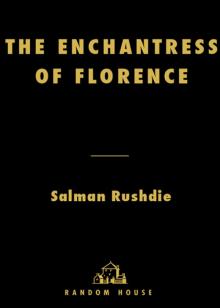 The Enchantress of Florence
The Enchantress of Florence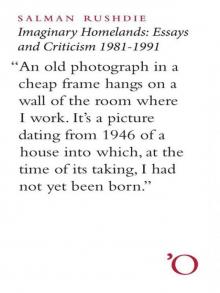 Imaginary Homelands: Essays and Criticism 1981-1991
Imaginary Homelands: Essays and Criticism 1981-1991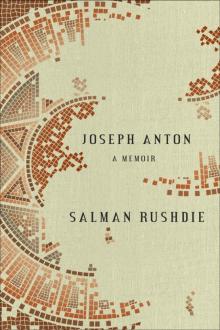 Joseph Anton: A Memoir
Joseph Anton: A Memoir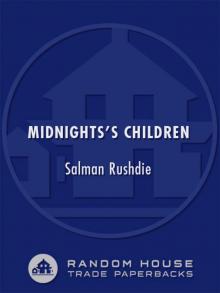 Midnight's Children
Midnight's Children East, West: Stories
East, West: Stories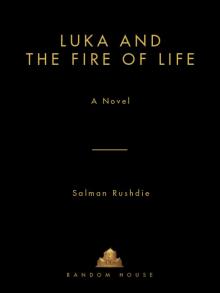 Luka and the Fire of Life
Luka and the Fire of Life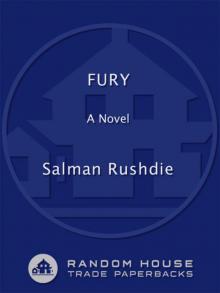 Fury Fury Fury
Fury Fury Fury Haroun and the Sea of Stories
Haroun and the Sea of Stories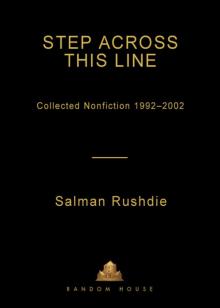 Step Across This Line: Collected Nonfiction 1992-2002
Step Across This Line: Collected Nonfiction 1992-2002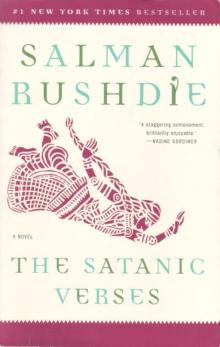 The Satanic Verses
The Satanic Verses The Moor's Last Sigh
The Moor's Last Sigh The Prophet's Hair
The Prophet's Hair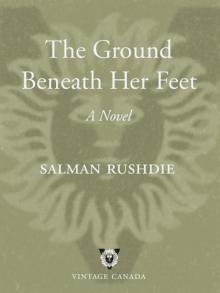 The Ground Beneath Her Feet
The Ground Beneath Her Feet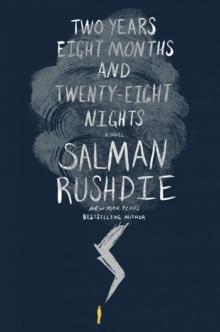 Two Years Eight Months and Twenty-Eight Nights
Two Years Eight Months and Twenty-Eight Nights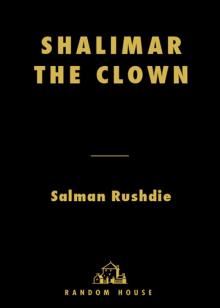 Shalimar the Clown
Shalimar the Clown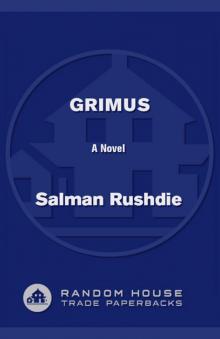 Grimus
Grimus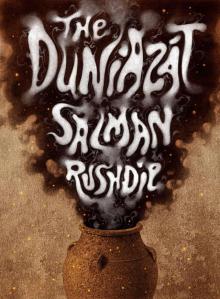 The Duniazát
The Duniazát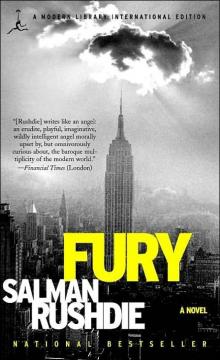 Fury
Fury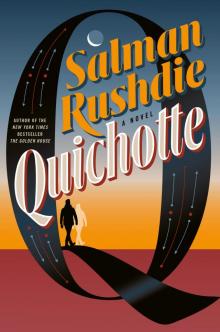 Quichotte
Quichotte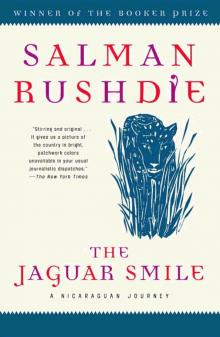 The Jaguar Smile
The Jaguar Smile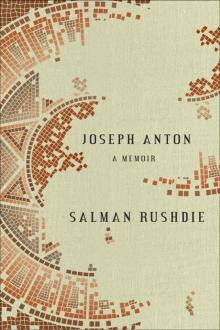 Joseph Anton
Joseph Anton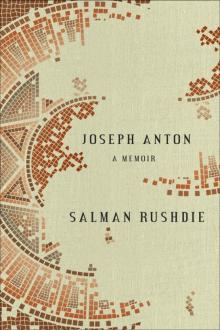 Joseph Anton: A Memoir: A Memoir
Joseph Anton: A Memoir: A Memoir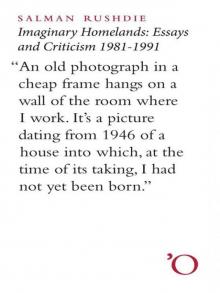 Imaginary Homelands
Imaginary Homelands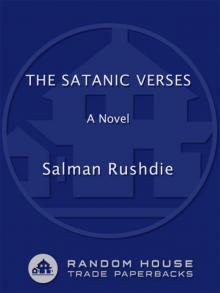 The Satanic Verses: A Novel
The Satanic Verses: A Novel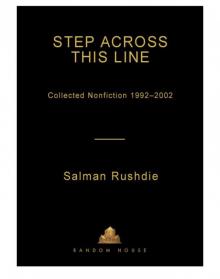 Step Across This Line
Step Across This Line East, West
East, West